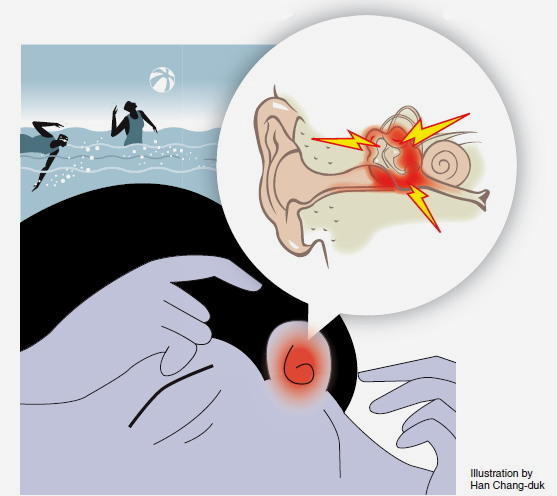Going to a swimming pool or a beach during summer vacation is quite enjoyable and indispensable. But while swimming, your ears could be affected when unclean water enters.
When swimming or taking a shower and water gets into your ear, you feel deafened or you may notice your voice sounding strange. This is a phenomenon caused when water remains between the external auditory canal and eardrum to interfere with the vibration of the eardrum. You stick one of your fingers into your ear or try to wipe it out with a sheet of paper or a towel, but to no avail. If you use a Q-tip to wipe it out, you might accidentally injure your ear canal. The skin of the external auditory canal is wet and susceptible to injury. The best solution is to turn the affected ear downward and shake your head lightly, so that the water can drain by itself. If there is some water remaining, it is OK since your body temperature will dry it out in time. If the symptoms last for more than a day, it would be better to see your ENT doctor as there is a possibility of an infection or the water cannot come out because of too much earwax.
The external auditory canal usually remains in a dry and acidic state, suppressing growth of bacteria. But when it becomes wet and water remains on it, the acid environment is adversely affected by the growth of bacteria in the earwax. When the inner skin comes off, the entire external auditory canal can be affected by infection. Therefore, people who swim often, live in a wet climate, pick their ears carelessly or whose ear canal is unusually narrow are especially susceptible to the external auditory canal infection (known as swimmer’s ear).
Let us look at the cause of this disease more carefully. In an environment where temperature and humidity are high, the outer side of the external auditory canal swells, blocking the exit route of the earwax gland and reducing secretion of the earwax together with edema. As we explain below, earwax has certain protective functions. If secretion of this earwax is reduced, injury can result easily from light scratching and bacteria can grow easily as acidity of the canal loses its potency. The bacteria that grow in the canal are original endotoxin protein and staphylococcus. Mold is discovered in about 10 percent of cases.
The symptoms usually start with irritability of the canal entrance or a sense of blocking. As the infection progresses, however, you feel more pain around the earflap, accompanied by stuffiness and decreased hearing. When it worsens, even the lymph nodes swell. When the outer side of the exterior auditory canal is severely swollen and filled with secretions but there is no problem with the eardrum, the difficulty in hearing is simply due to blockage in the exterior auditory canal. Although there is some discharge within the ear, it rarely flows out.
The treatment starts with removal of the secretion and the discharge. Next, liquid medicine, usually an antibiotic and anti-inflammatory drug, is applied regularly. Then, to maintain the acidity level, acid liquid medicine can be used, or the inside of the ear can be cleansed with vinegar.
Sometimes the outer-side of the external auditory canal is so swollen that liquid medicine cannot be applied. In such cases, use a piece of gauze as a wick so that the medicine can reach inside. To relieve pain, you may need a painkiller. An antibiotic can be taken orally when the pain is severe. Above all else, be sure to keep any water from getting into the ear during the treatment. When taking a shower, use an ear plug to block the water and to prevent too much humidity. You can find earplugs easily at swimming pools. If you think an earplug is not enough, you can apply some Vaseline to help with waterproofing. When you suspect that water has already entered, use a hair dryer with cold air to dry the affected area.
 |
| Moon Il-joon |
By Moon Il-joon
The author is a specialist at Samsung Medical Center’s Department of Otorhinolaryngology (head and neck surgery). ― Ed.



